Indonesia’s Terror Threat
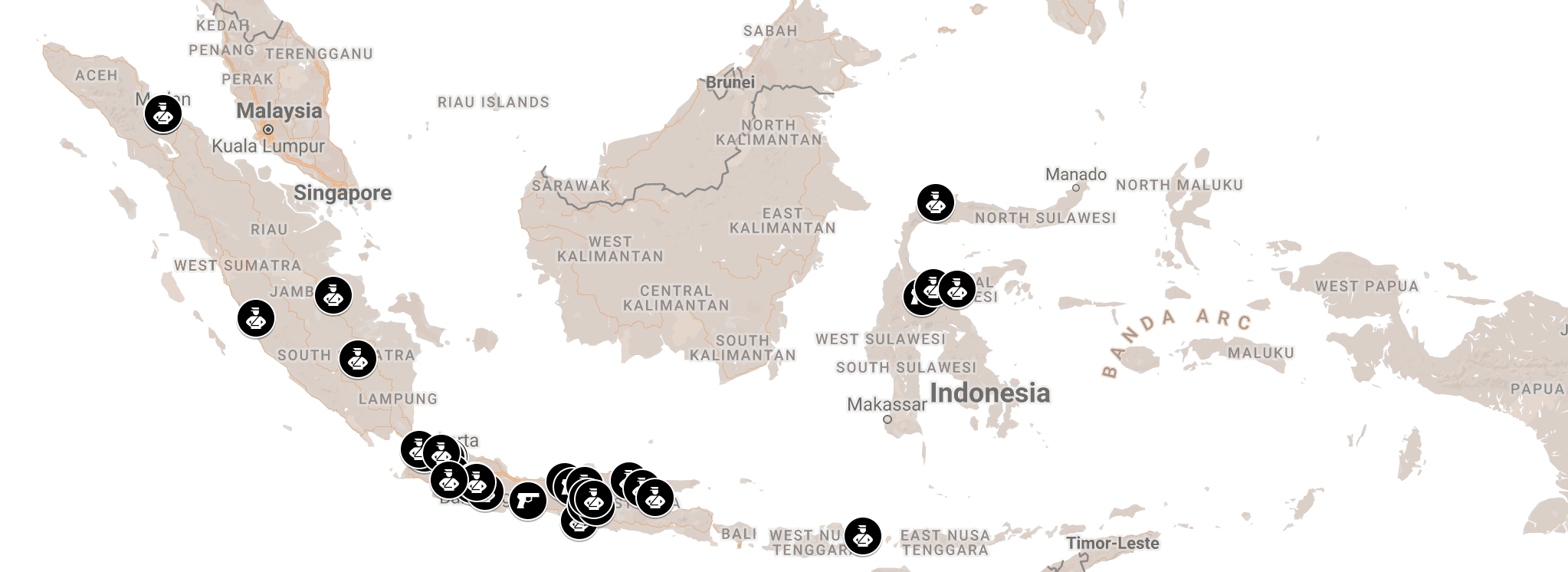

Terror related attacks and arrests in Indonesia in 2017 (Click on above image to expand)
The siege in Marawi City by the Maute Group, an ISIS affiliated group in the southern Philippines, which began on May 23rd when the militants took over the city, is still ongoing seven weeks later. While the Filipino Army has been able to retake large swaths of the city back, the militants still control a number of buildings and continue to hold civilians hostage using them as human shields, and in some cases forcing them to loot or to fight for them. This siege has shown the level of collaboration between ISIS affiliated groups in the Philippines, particularly the Maute Group and Abu Sayyaf, but has also shown the scale of the threat ISIS poses to not only the Philippines, but also the region.
During the fighting, a number of militants killed were found to have come from countries in the region such as Indonesia, Malaysia and Singapore. For these countries, the threat is that militants from Marawi City try to come back to their countries of origin if they are able to escape, and continue their attacks on home soil. To prevent this from happening, Indonesia, Malaysia and the Philippines have begun joint maritime and air patrols in the Sulu and Celebes Seas, surveying and blocking any routes the militants could take. Indonesia has also announced it would build a military base on Morotai Island, just south of Mindanao in order to better secure its border with the Philippines.


Terror related attacks and arrests on the island of Java, Indonesia in 2017. (Click on above image to expand)
While the events in Marawi City showcase certain security and policy flaws in regard to combating terrorism, particularly in the Philippines, it is important for other countries to continue their own efforts at home. Indonesia has been proactive in its counter-terrorism efforts, particularly since the Bali bombings in 2002 which killed 202 people. Their counter-terror unit, Densus 88, has been at the forefront of combating terrorism nationally, yet the past few weeks has seen a spike in attacks and arrests. These significant incidents include the following:
On May 24th, 2017 around 9 p.m. two explosions took place near a Transjarkata bus stop in Kampung Melayu in East Jakarta. The death toll of this incident included 3 policemen and the two suicide bombers. The incident wounded 5 other police officers and 5 civilians. Through further investigation, it was found that the bombs were made with pressure cookers packed with explosives, nails, and buckshot. This is a similar make as the bomb used in an attack near a school in Bandung on February 27th by two terrorists which failed to hurt or kill anyone.
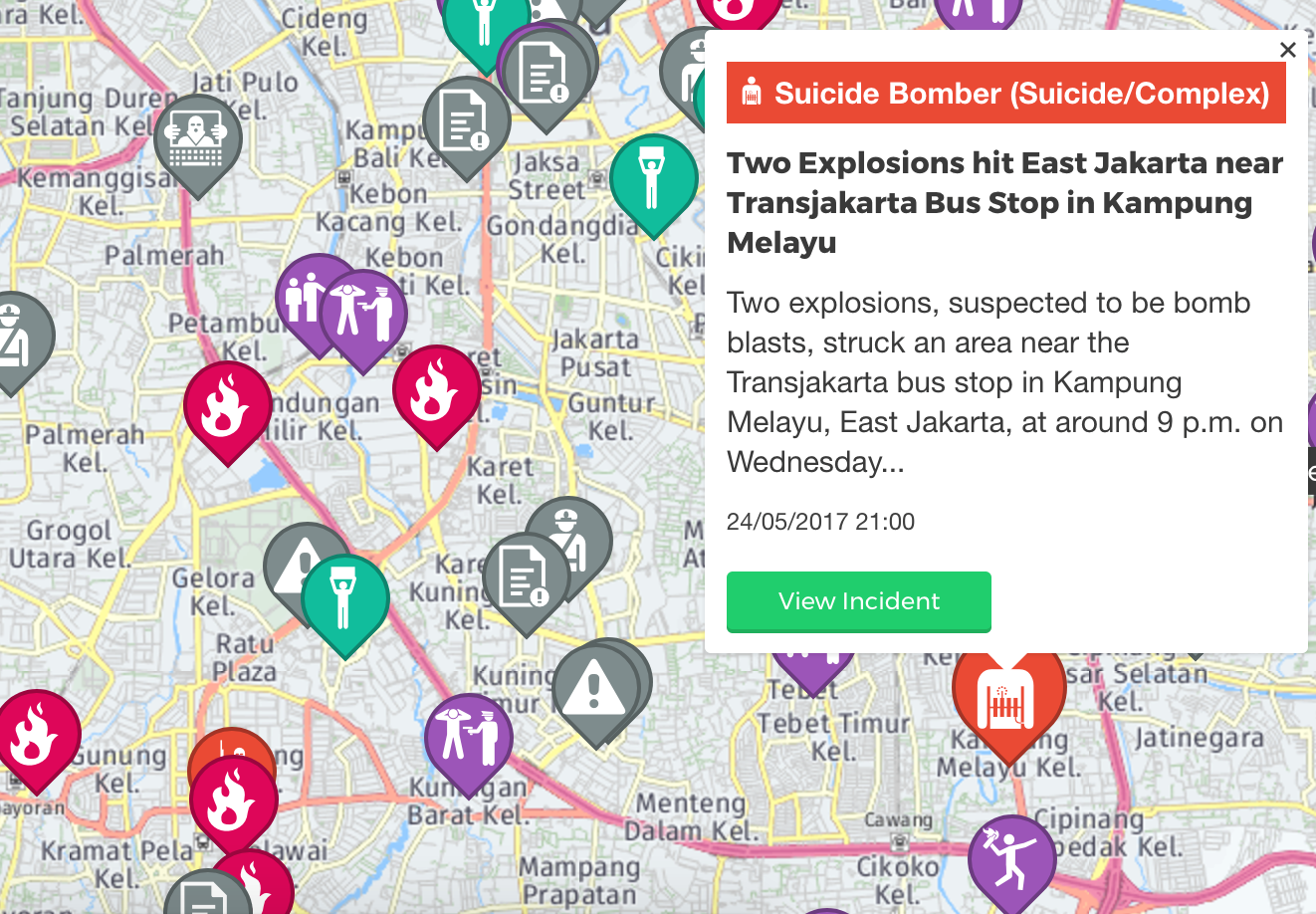
In the month that followed the bombing, 40 alleged terrorists were arrested in Bandung, Banten, Malang, Surabaya, Temanggung, Kendal, Jambi, Medan and Bima. They were believed to be planning to launch car bomb attacks against police in several cities across the country. Police have said that many of these 40 individuals were part of Jemaah Ansharut Daulat (JAD), one of the several terror groups in Indonesia. JAD is believed to be the group behind several attacks and plots, including the attack in May.
Jemaah Ansharut Daulat was formed in 2015 in Indonesia, and pledged their allegiance to the ISIS leader at the time, Abu Bakr al-Baghdadi. The group consists of different factions including Jamaah Ansharut Tauhid (a splinter group from the larger Jemaah Islamiyah), the Maman Abdurahman Group, the East Indonesia Mujahidin (MIT), and the Al Mujahirun Group. Not only is JAD suspected of being the group that undertook the bombing in May, but they were also responsible for the January 2016 attack in Jakarta which killed 4 civilians and all 4 attackers, and was seen as the first attack by the Islamic State in South East Asia. The U.S. State Department declared JAD a terrorist group in January 2017.
Since the bombing in Jakarta in May, several additional attacks have taken place targeting police officers. On June 25th, two men attacked a police checkpoint outside the North Sumatra Police Headquarters in the city of Medan. The two men stabbed a police officer to death before other officers came and shot one of the assailants to death and arrested the other. It is believed the attackers not only had planned to kill police officers, but also to steal their weapons in order to commit further attacks. After the incident police arrested several additional suspects including the wife of one of the assailants. One of those arrested is believed to have helped plan by doing reconnaissance on the target area. Follow-up raids on the residences of the assailants revealed ISIS propaganda targeted for children.
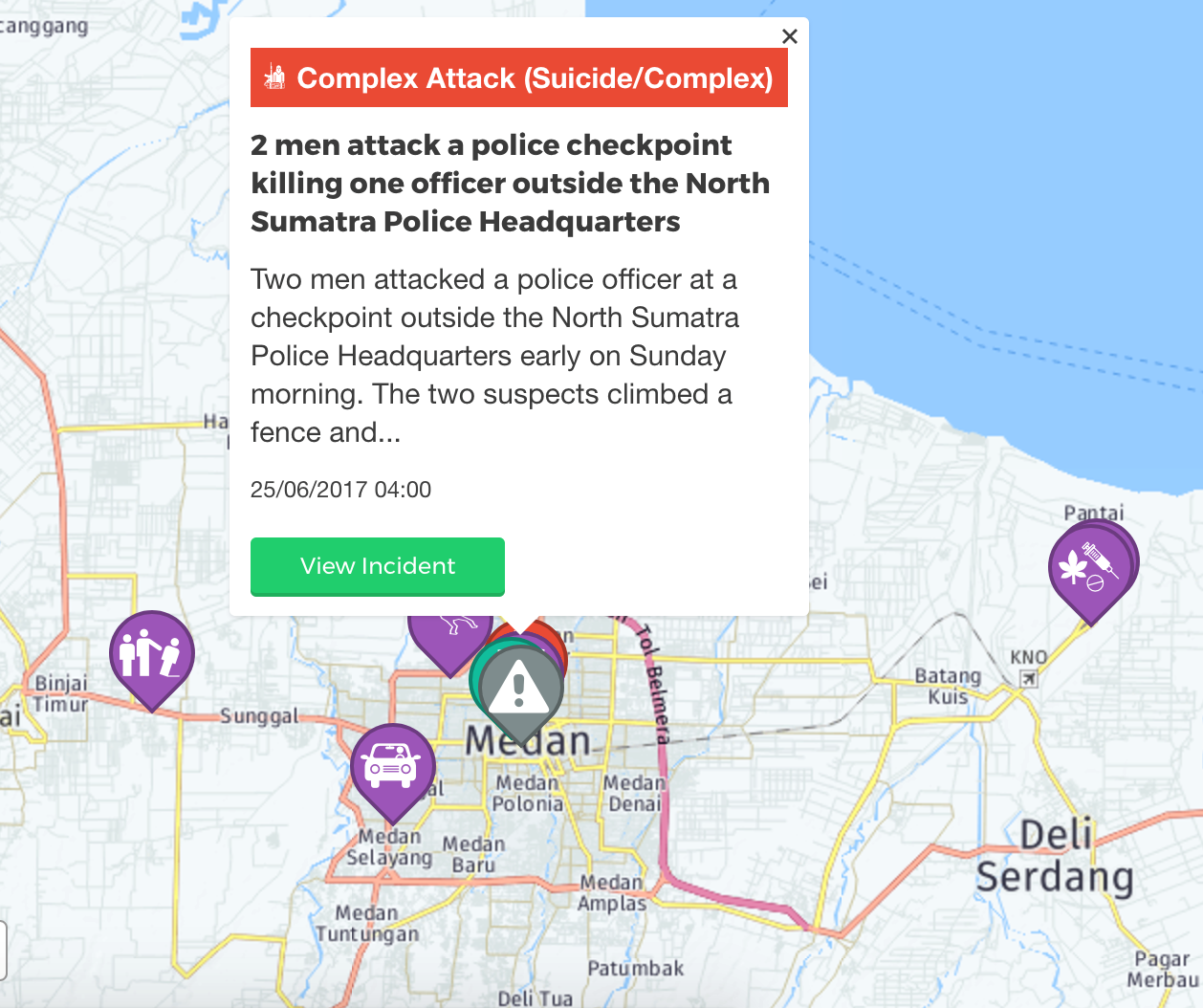
Two days later, on June 27th, a man was seen on CCTV spreading flyers in the city of Serang, Banten, including on police cars, which threatened the police and crowded areas. A few days later, on June 30th, another attack on police officers took place, this time in Jakarta. The incident involved a militant stabbing two police officers who were inside a mosque praying near the Bhayangkara Police Headquarters. The officers were wounded in the attack, while the assailant was shot dead by police officers a street over from the place where the attack took place.
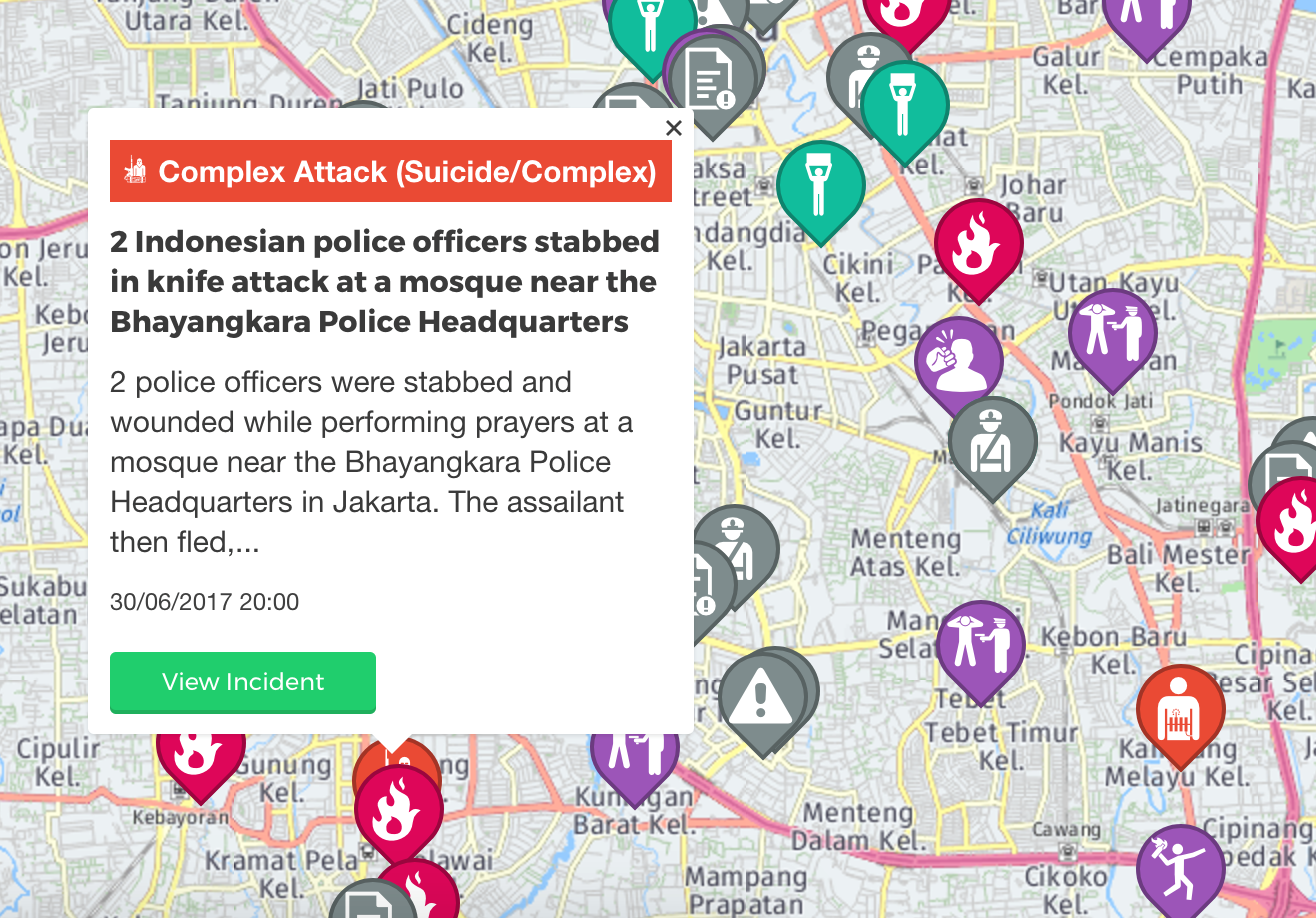
Several days later, on July 4th, a man raised the ISIS black standard on the gates of a police station in Kebayoran Lama in South Jakarta. In addition to the flag was a letter of which the content threatened police, the military, and other agencies. The letter also threatened to turn Jakarta into a Marawi-style situation, referring to the ongoing situation in the Philippines, and that a war has begun in which they would overthrow the Indonesian Government and replace it with an Islamic State.
Analysis
The rise of incidents these past few weeks show that despite counter-terror operations in the country, there are still a number of militants that are able to plan and execute attacks within the country. The national police have said that there are upwards of 600 Indonesians being tracked by the authorities, including 290 residing in Indonesia, who have alleged links to the Islamic State. Although the list includes the names of adults, children, those who have died in battle, those who have failed to leave for Syria and Iraq, and those who have been deported back to Indonesia, it remains a substantial number of potential assailants. Those who return to Indonesia from Syria and Iraq are forced into de-radicalization programmes such as the one run by the Bampu Ampus shelter which recently released 152 people after completing a month-long programme. Questions regarding these programmes and their lengths will present themselves if it was ever revealed that a graduate of these programme committed an attack in Indonesia after the programme ended.
While Marawi City will be retaken by the Filipino forces in the near future, the duration of the siege, which was not expected on the part of the Filipino government, has played a critical role for the propaganda of jihadist groups in the region, showing potential recruits the strength such groups have. This could play a role in replenishing the ranks of certain groups and increasing the threat to countries in the region. This is particularly important as the Islamic State territory in Iraq and Syria is dwindling, especially after the recent loss of Mosul from their control. In June, the Islamic State called for more attacks to be undertaken in the Philippines, Indonesia, Malaysia and Singapore among others. These countries were described as part of the Islamic States âEast Asia wilayatâ. This declaration and the events that have so far taken place show that attacks will continue, and there is a need to better understand what are the threats and potential targets of such militants.
Threat and Targets
Most attacks have taken place on the island of Java, one of the islands that makes up Indonesia, and which is home to over 56% of Indonesia’s population. The island is home to several of Indonesia’s largest cities including Jakarta (#1), Surabaya (#2), Bandung (#3), and Bekasi (#5). The #4 spot is held by Medan, on the island of Sumatra, which is where the attack on the North Sumatran Police Headquarters took place in June.
One of the most recent terror related incidents at the time of writing involved the arrest of a bomb maker in Bandung. The man was arrested after the bomb he was preparing exploded and alerted authorities. Investigation by police found that the man and 2 accomplices were planning to bomb a café in Braga, a restaurant in restaurant in Astana Anyar and a church in Buah Batu, all located in Bandung. The two accomplices were arrested in follow-up operations in Bandung. The bomb that went off at the bomber’s house was meant to go off at the café on July 16th.
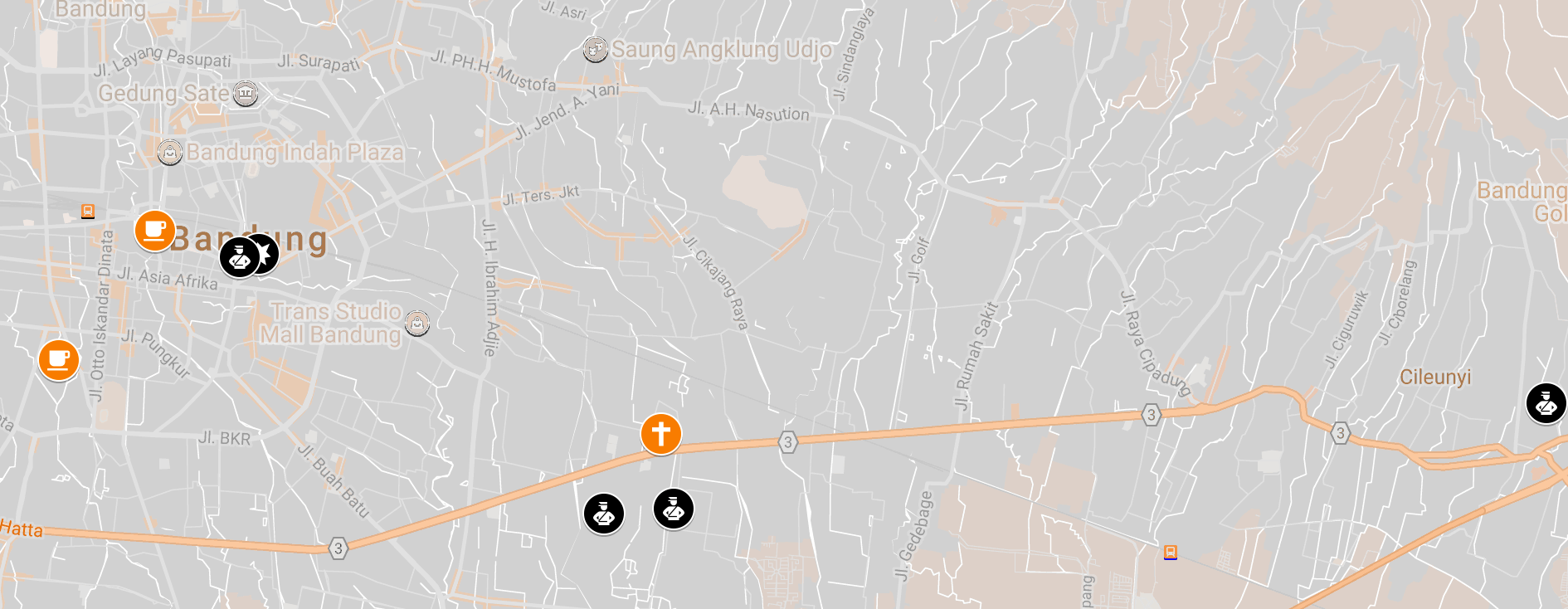

Snapshot of Bandung: The black markers represent the attacks and arrests that took place in Bandung since January 2017. The sole attack was a pressure cooker bomb in central Bandung in February which did not kill or wound anyone. The three black markers at the bottom of the image represent the arrests of the 3 militants linked to the most recent incident where a bomb exploded at the bomb makerâs house, leading to the discovery of a plot to bomb several targets in Bandung. The orange markers represent the potential targets of that bomb plot. A café, a restaurant, and a church were looked at potential targets, with the bomb at the café meant to go off on July 16th.
Past attacks, arrests and seized documents from raids have revealed that assailants have looked primarily at attacking targets that include the police, whether physical infrastructure such as police headquarters or officers in the street, as seen during the attacks in June. Suspects arrested in March following the pressure cooker bombing in Bandung in February revealed that they had planned further attacks at the police headquarters, a police precinct, and traffic police outposts around the city. For the time being it seems that militants already have certain targets in mind, have the skills needed to make crude explosives, but lack in the execution of the attacks. Discussions between police and two of the suspects in the most recent event have shown that they are learning from their past attempts of making bombs, looking to improve casualty rates. This exemplifies that future attacks may become deadlier than some of the attacks so far in 2017. Areas where significant attacks are most likely to occur, based on past incidents and analysis, are Jakarta and Bandung without discounting tourist hotspots such as Bali.
To combat the continued threat of terrorism that has been seen in Indonesia, particularly of groups who have pledged allegiance to the Islamic State, and who have undertaken attacks since January 2016, the government has looked into strengthening their anti-terrorism laws and laws regarding radical groups. Since the attack in January 2016 which was the first claimed by ISIS, but perpetrated by JAD, the government has drafted amendments to their anti-terrorism law. These amendments would look to broaden the definition of ‘terrorism’, would increase the period of time suspects can be detained without trial from one week to 3 months, and would allow police to be able to arrest those returning from Syria and Iraq, rather than just be able to monitor them and only arrest them when they are in the planning stage of a potential attack or when the crime has already been committed. Additionally, the amendments to the law would also lead to stripping the citizenship of an Indonesian who has joined militant training or participated in acts of terror in foreign countries. President Jokowi has pushed for a speed up in the deliberations regarding the new law, particularly since the bombing attack in east Jakarta which killed 3 police officers in May. Until such amendments come into effect, Densus 88 will continue to use the tools at their disposal to arrest militants and respond to any attacks swiftly.
